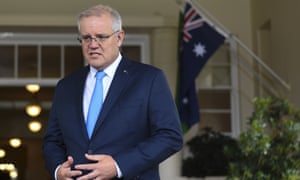Extract from The Guardian
Organisers of global climate summit tell Australian PM ‘there will be no space for general statements’
Britain and France are leading a group of countries calling on the Australian government to make ambitious new commitments to combat the climate crisis by next month if Scott Morrison is to speak at a global summit on the issue.
A letter sent to Morrison and other national leaders on 22 October called on countries to rebuild economies after the coronavirus “in a way that charts a greener, more resilient, sustainable path” that puts the world on track to limit global heating to 1.5C above pre-industrial levels.
It said this required all countries to increase their commitments to meet the goals of the Paris agreement, in line with the pledge made five years ago to ratchet up policies and targets over time. In this context, the co-hosts of the summit, which also include Chile, Italy and the United Nations, were inviting leaders to an online “climate ambition summit” on 12 December.
Speaking slots will be given only to leaders who set stronger targets to cut greenhouse gas emissions over the next decade, announce a long-term strategy to reach net zero emissions, commit new finance for developing countries or have ambitious plans and policies to adapt to locked-in climate change impacts.
The letter – signed by Boris Johnson, Emmanuel Macron, Chilean president Sebastián Piñera, Italian prime minister Giuseppe Conte and the UN secretary general, Antonio Guterres – said “we hope to see you in December with a bold new commitment”.
“There will be no space for general statements,” it said.
A Morrison government spokesperson said on Monday it had received the letter and was considering its response.
Morrison did not attend a UN climate action summit in New York last year despite being in the US to visit the Trump administration at the time. Speaking slots at that event were also reserved for countries announcing new commitments.
The December summit was discussed in a phone call between Johnson and Morrison last week. Johnson encouraged Morrison to commit Australia to a target of reducing emissions to net zero by 2050. According to a statement from Downing Street, he noted the British experience had demonstrated that “driving economic growth and reducing emissions can go hand in hand”.
Morrison has rejected the target, which was adopted last week by Japan and South Korea, the fifth and seventh biggest emitters in the world respectively. His discussion with Johnson about it was not included in the Australian readout on the call.
Australia has emphasised a “technology over taxes” approach, including a statement that sets “stretch goals” at which point some clean technologies – “clean” hydrogen, energy storage, “low-carbon” steel and aluminium, carbon capture and storage and soil carbon – would become economically competitive with alternatives. The stretch goals are not tied to a timeframe or policies that require increased use of the technologies.
Politico Europe, which first published details of the letter, reported that the leaders of Japan and China, which recently announced it would reach net zero emissions before 2060, were expected to be invited to speak at the summit.
It said Europe’s invitation would depend on the result of a European Council meeting on 10-11 December, where leaders will discuss increasing its target for 2030 from a 40% cut below 1990 levels to up to a 60% cut. It has a net zero goal for mid-century.
Britain was the first G7 country to legislate a target of net zero greenhouse gas emissions by 2050. Its emissions have fallen more than 40% since 1990 while its economy has continued to grow.
The Morrison government has set a 2030 emissions reduction target of between 26% and 28% below 2005 levels, having rejected a science-based recommendation by the Climate Change Authority of a 45%-60% cut over that timeframe.
It has said it would meet net zero at an unspecified point in the second half of the century and stopped making payments to the body responsible for climate finance for developing countries, the green climate fund, last year. Britain, which is hosting the next major UN climate summit in Glasgow next year, has called on industrialised countries to join it in doubling contributions to the fund.
A net zero emissions target is supported by more than 70 countries, about 400 cities, every Australian state and major Australian business, industry, union, farming and welfare groups.
A Morrison government spokesperson said on Monday it was investing in new energy technologies that would see Australia “meet and beat” its emissions reduction commitments while cutting energy prices and creating jobs.
Government emissions projections released last December suggested Australia would miss its 2030 target unless it used contentious carryover credits from the previous climate deal, the Kyoto protocol. A Senate estimates hearing last week confirmed Australia was the only country planning to claim the credits, which are opposed by several nations and which analysts have suggested have no legal basis under the Paris agreement.
The spokesperson said Australia had met its 2020 target under the Kyoto protocol, which was a 5% cut below 2000 levels by 2020. According to the most recent government data, national emissions are 3% lower than in 2000. Australia is meeting its Kyoto target through the use of carbon accounting rules.
The spokesperson said Australia’s performance contrasted with other countries, citing a 2019 UN Environment Programme emissions gap report that found six G20 economies were expected to either meet or barely meet their 2020 targets.
They said Australia’s emissions reduced by about 13% between 2005 and 2018 while New Zealand’s fell by less than 1% and Canada’s emissions flatlined.
The change in Australia’s emissions mostly occurred under the Labor governments between 2007 and 2013, when they fell nearly 15%. They had dropped 2.2% since the Coalition was elected in 2013, according to the most recent government data, covering the year to March.
.png)

No comments:
Post a Comment